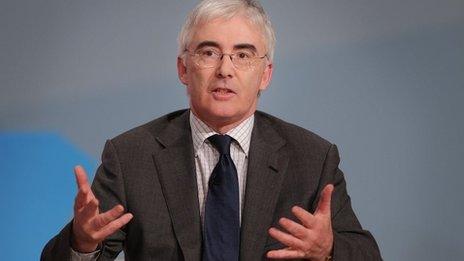Learning disability employment rate 'unacceptable'
- Published
Julian Mason's son Ben, who has a learning disability, says the minimum wage is a hurdle to him
Just over a year ago, government minister Lord Freud came under fire for suggesting some disabled people could be paid less than the minimum wage to get them into work. The issue prodded the national conscience.
Despite this, the employment rate of those with learning disabilities continues to drop and currently stands at just 6% in England. Minister for Disabled People Justin Tomlinson says this is "unacceptable".
Disability news correspondent Nikki Fox examines how people are affected by the issue.
As Julian Mason watches his son, Ben, working hard in a café in Chesterfield, his face glows with pride.
His 33-year-old son is dedicated to his job - he's been serving coffees, teas and bacon sandwiches for over a decade.
The problem is, he's never been paid.
Ben, who has a learning disability called fragile X syndrome, is a volunteer, and like many others with learning disabilities he has worked for free for many years.
Julian is concerned for his son's future and he desperately wants to find him a paid job.
"Finding Ben a job is proving very, very difficult," he says.
"He loves what he does here at Ability Cafe and he works hard. The problem is, it's time he got a job where he earned money."
Disabled pay row minister apologises (Oct 2014)
Contrary to the outcry around Lord Freud's comments last year, Julian says he would be happy for his son to be paid less than the minimum wage of £6.70 an hour.
"I know the minimum wage has been fought for for many years and is regarded as sacrosanct by many organisations," Julian says, "but if there are only 6% of people with learning disabilities in employment, then something is going very wrong.
"If Ben is only going to be paid, let's say £2.50 an hour, that's fine.
"He's a very cheerful person who works very well but at a reduced pace to someone who isn't disabled."
Supported employment
Julian's opinions are controversial, but there are questions over the current attempts to get people into work.
According to the Health and Social Care Information Centre, the percentage of people with learning disabilities in paid employment has decreased over the past four years in England.
It's dropped from 7.1% to 6% - fewer than 10,000 people in real, fully paid jobs.
Organisations that have carried out extensive research into this problem say that bespoke tailored support is the answer.
Rob Greig, who runs the national development team for inclusion, insists the only model that has any evidence of success is the supported employment model.
This is where a support worker offers help to both the employee and the employer so they can get the best out of each other.
He is adamant that people with learning disabilities, with the right support, can earn at least the minimum wage and flourish in a career of their choice.
"If you reduce the minimum wage for people with learning disabilities, then you immediately begin to devalue the job that people do," he says.
"The right support for people is paramount, and that's why supported employment works so well."
'Independence'
Sam Haslam, who has Down's syndrome, is a prime example of that.
The 27-year-old works at Eton College and serves more than 600 students a day in the prestigious school's cafeteria.
He's been working there for the past two years.
"It's so busy here, we serve the boys and they love to eat," he says.
"I love this work, many others haven't got work who are like me. I have done lots of work experience and now I work here. It gives me independence."

Sam Haslam loves working at Eton College, where he wants to further his career as a chef
Due to the support from a local organisation, Ways in Work, Sam is able to work alongside his peers.
The manager of the cafeteria, Andrew Ridout, says the benefits of having someone like Sam working for him far outweigh the extra bit of time and effort at the beginning.
"Sam is a fabulous employee, he does lift the team, his laugh is infectious and he brings a whole new dimension to the team," Andrew says.
"I've gone through a huge learning curve with employing Sam.
"I was briefed to treat Sam as exactly the same as any other employee, so the expectations are exactly the same. His work is of an exceptional standard."
'Huge amount to offer'
Sam is just one example of how supported employment can bring about real change in the job market, but this is not a picture reflected across the country.
Minister for Disabled People Justin Tomlinson says it is "unacceptable" that so many people with learning difficulties continue to be overlooked for work.
"Employers need to understand that jobseekers with disabilities have a huge amount to offer and we continue to raise awareness of this through our Disability Confident campaign," he says.
"Our access to work scheme also has a specialist team to support those with hidden impairments and last year a record number of people with learning disabilities were supported into employment."
He is endorsing a partnership between the hotel chain, the Hilton Worldwide, and the specialist training college, Foxes Academy in Somerset.
The college regularly finds jobs for its catering students by training them at its hotel on site.
The numbers are small, but the minister says this is an excellent way of getting people with learning disabilities into the job market.
Around half of those who graduated last year found paid employment.
- Published15 October 2014

- Published1 April 2016

- Published17 March 2015
